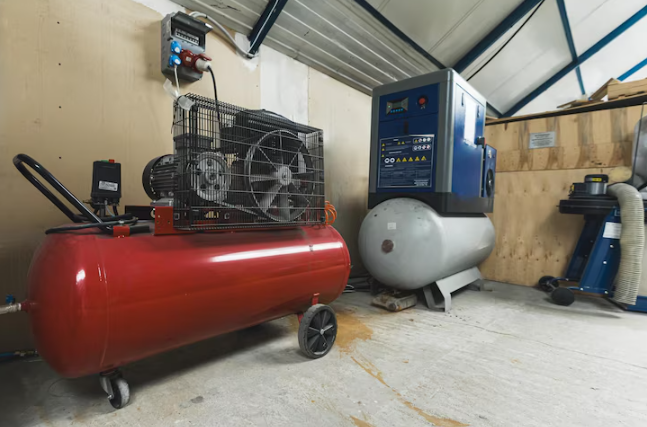An increasing number of sectors are transitioning to oil-free air compressors and for good reason. Such systems generate clean, high-quality air that is crucial for modern food processing, healthcare, and cleanroom manufacturing. Businesses now realize the operational gains that come with using air compressors devoid of contamination, which has driven robust growth in the global oil-free compressor market.
What Makes Oil-Free Compressors Unique?
Oil-free compressors ensure zero risk in oil contaminating your air supply, unlike traditional compressors that use oil to lubricate. They use Teflon coated parts or water-based lubricants to remove friction, advancing the compressor’s engineering. Smooth operation, without traditional lubricants, is also achieved through advanced magnetic bearings, special coatings, and tight manufacturing tolerances.
Compressors utilizing oil-free technology can be divided into two categories: oil-free by design and technically oil-free. oil-free by design types lack oil in the compression chamber. on the contrary, technically oil-free versions may contain oil in sealed bearings but ingenious sealing strategies guarantee there’s no contact with the compressed air stream.
Cross-Industry Advantages
Clean output: In industries such as pharmaceuticals and food manufacturing, cleanliness is paramount. These sectors face absolute horrors if even minute traces of oil permeate their products. Not only does “Clean Output” eliminate used oil disposal, but it also oil-free carryover precludes product contamination.
Reduced Maintenance: The elimination of oil changes results in no more moving parts, simplifying operations. Because of this reduction, maintenance costs are slashed, further reducing Total Cost of Ownership (TCO). Reduced TCO gained through less equipment downtime extends lasting value to the machinery’s lifespan.
Environmental Safety: Abandoning used oil adds to the lack of stringent oil disposal while also meeting environmental standards. With oil-free compressors, businesses directly tackle their Sustainability Goals and ISO 14001 compliance. Eliminating the suspension of used oil adds to the reduced carbon footprint aiding compliance to environmental management systems.
Reinforced Reliability: Avoiding unexpected failures guarantees exceptional performance throughout. Modern oil compressors integrate high-tech tech that bolsters reliability. These refrigerant compressors offer a myriad of perks, including forecasting maintenance alerts, real-time performance metrics, and remote diagnostics streaming unparalleled operational insight into peak performance.
Frequent Uses
Best apply for all oil-free air compressors:
Food and Beverage Sector: Elevating air contacting consumable products, beverage bottling, and pneumatic conveying lifts cry food packaging.
Dentistry and Pharmaceuticals: Non-negotiable of device manufacturing, hospital pneumatic framework, and at the latter’s end tablet coating showcase sterile air use.
Electronics and Technology Sectors: Assembly of electronics, fabrication of semiconductors, production of circuit boards, and precision calibration of instruments requiring clean air environments.
Automotive and Aerospace Sectors: Spraying of paint and precision manufacturing with exacting surface finish standards. Testing of components.
Textile and Paper Industries: Operations of paper mills, dyeing of fabrics, and production of fibers which may be contaminated with oil and cause permanent staining or degrade the material’s quality.
Performance Evaluations
For oil-free compressors, think about other factors aside from not providing contamination. As of late, energy efficiency has improved due to new models implementing variable speed drives, as well as smart and adaptive controls that regulate power usage based on demand. Many devices have also inline heat recovery systems that capture waste heat for space conditioning or other heating process applications, thus increasing operational efficiency.
Tuhless-Spasov-dimitrov-noise-levels-70-decibels-occupacyed-spaces.
Limitations to Consider
In industrial settings where work conditions are extreme, oil-free compressors may not work. Some industries may find these devices too expensive owing to the higher initial cost which is between 15 to 25% in comparison to oil-lubricated models or slightly higher energy consumption in some applications.
On top of that, the need for seal and gasket maintenance on oil-free compressors could require more frequent servicing, but this is frequently counterbalanced by the lack of needed oil changes or servicing for other components.
Making the Right Choice
Think about an air quality audit to assess the current contamination levels as well as possible risks to your products or processes in relation to your requirements for compliance.
Conclusion
For some businesses, the impact could be transformative, especially in sectors where air cleanliness is essential for product quality and compliance with industry standards. Businesses focused primarily on air cleanliness and reduced maintenance will find that a top-rated oil-free air compressor provides unparalleled long-term returns, reduces operational costs, enhances peace of mind, and improves profitability by streamlining processes. Companies that prioritize innovation and sustainability will find the now-mature technology of oil-free compressors to be exceptionally beneficial.




